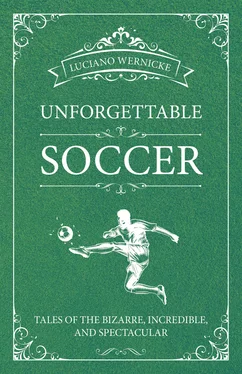Hundreds of disgruntled fans invaded the field and ran after the Olimpia players and, mainly, the referee, to gratify their need for revenge for what they considered a tremendous injustice. The police could do little to contain the anger of so many people. Several of Olimpia’s players received unmitigated punching and kicking. Assisted by a handful of policemen, the Paraguayans managed to escape the mob and lock themselves in their dressing room. Wright and his assistants, meanwhile, had to remain in their dressing room for several hours because the stadium had been surrounded by hundreds of outraged spectators. As revealed by Wilstermann midfielder Johnny Villarroel many years later during an interview, the only way Wright would leave the stadium was disguised as a woman. The Brazilian and his collaborators were taken to the city of Oruro more than 125 miles from Cochabamba, because they were told that a crowd of fans was waiting for the referee at the Cochabamba airport.
Because of this incident, CONMEBOL suspended the Felix Capriles stadium for a long time and ejected the five players. Club Jorge Wilstermann played the two remaining games at home in Santa Cruz de la Sierra and La Paz. They lost them, too. Olimpia, meanwhile, went to the next round: they won the group, then the semifinal, and, in the final, lifted the Copa Libertadores after dethroning the Argentine champion, Boca Juniors. Wright, meanwhile, would experience another very dark night in this continental tournament two years later, but that story is still to come.
What kind of record can a goalkeeper of the Botswana national team have? A very unique one, as it turns out. Goalkeeper Modiri Marumo, who was also the captain of “the zebras,” was the only player ever to receive a red card during a penalty shootout. Crazy, yes, but real. During the Castle Cup played in South Africa in 2003, the Botswana versus Malawi match ended in a 1-1 draw. Referee Mateus Infante from Mozambique called for the game to be decided from the twelve yards. The singular incident occurred after Malawian Philip Nyasulu scored the third goal of the series for his team. Nyasulu approached the defeated Marumo and gave him a pat on the shoulder, which Marumo answered with a blow to Nyasulu’s face. Infante, of course, showed the red card to the goalkeeper for his improper reaction. “I reacted badly; I am committed to make sure this does not happen again. I behaved inappropriately which embarrasses me. I hope my apologies will be accepted, and I will be able to serve my nation again,” Marumo said to the press. How did the series of penalties continue? Botswana missed the next shot, and Malawian Ganizani Malunga sealed the victory for his country by beating Michael Mogaladi, a defender who had to guard the goal in place of the expelled goalkeeper.
Soccer and radio maintain a powerful and almost centennial romance. So deeply rooted are the games’ transmissions that many fans turn down the volume on their television and turn up the volume their radios to follow the images on the screen with the narration of their favorite play-by-play radio announcer. Others go to the stadium with their headphones on to hear someone describe what they are watching. But nothing is as unusual as a soccer player following the circumstances of a game on the radio…while he’s playing!
On October 11, 1992, at La Bombonera, CA Boca Juniors (who hadn’t won an Argentine championship for eleven years) received their bitter “superclásico” rival, CA River Plate. The xeneize squad was at the top of the standings with 14 points, followed closely by its biggest enemy with 13. At 65 minutes, Boca was up 1-0 thanks to a goal from Uruguayan Sergio Martinez. Then, referee Juan Carlos Lousteau called a foul; one of the well-known “divers,” millionaire Ariel Ortega, master of the art of falling down, was sandwiched between defenders, Carlos MacAllister and Alejandro Giuntini from the host team. A Boca supporter, enraged by the referee’s decision, threw his small yellow radio at the rival goalkeeper, Ángel Comizzo. The device fell within three feet of the goalie, who had the smart idea of taking it, putting on the headphones, and following the call of the radio announcers to hear Hernán Díaz’s shot from twelve yards, with his back to the play and in front of the opposing fans. But the powerful crossed shot of Diaz was rejected by the hands of the Boca number “1,” Carlos Navarro Montoya, and Comizzo, enraged, plucked the small speakers from his ears and threw the fateful apparatus toward the wire fence. The match finished without further displays of emotion, and Boca maintained the 1-0 advantage. At the end of that Sunday, the club from the port extended its advantage over River by three points, which allowed them to win the championship a few weeks later and leave their historic adversary empty handed.
Конец ознакомительного фрагмента.
Текст предоставлен ООО «ЛитРес».
Прочитайте эту книгу целиком, купив полную легальную версию на ЛитРес.
Безопасно оплатить книгу можно банковской картой Visa, MasterCard, Maestro, со счета мобильного телефона, с платежного терминала, в салоне МТС или Связной, через PayPal, WebMoney, Яндекс.Деньги, QIWI Кошелек, бонусными картами или другим удобным Вам способом.












